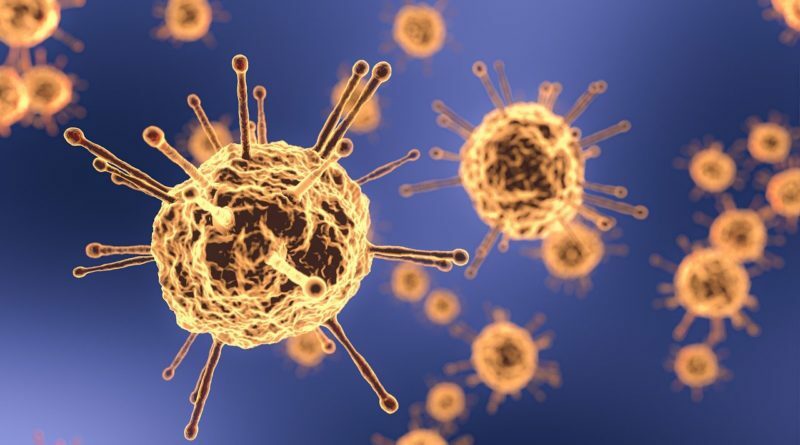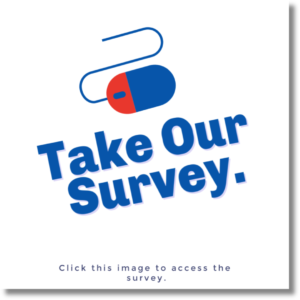Percentage of Positive Cases Now Over 33%
New cases of COVID-19 remained over 1,000 each day through the weekend, but Sunday marked the first time in some time that there were no new deaths associated with the virus. Community spread, though, continues to account for almost all of the cases of the virus. We have your bullet points today:
- Percentage of positive cases now over 33%;
- DDCCHS announces emergency housing assistance;
- Parkland says most businesses cannot require a negative test for return to work;
- The FBI warns about potential fraud schemes associated with COVID-19 testing.
Percentage of Positive Cases Now Over 33%
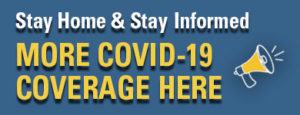
A total of 3,250 new cases of the novel coronavirus were reported by Dallas County health officials between Friday and Sunday, and an additional eight deaths, bringing the county’s total cases up to 25,840, including 395 deaths.
For reference, last Sunday, the total case count was 20,165, and 352 deaths.
The county reported 1,085 new cases and six deaths on Friday, 1,103 new cases and two deaths on Saturday, and 1,062 new cases and no deaths on Sunday.
“It took us 92 days to reach 300 cases, 22 days to reach the next 400 more cases at 700 cases and 2 days to reach another 400 cases at 1,100,” Dallas County Judge Clay Jenkins said.
Among the dead are a Grand Prairie man in his 60s, an Irving woman in her 60s, a Garland woman in her 60s, an Irving man in his 70s, a Balch Springs man in his 70s, and a Dallas woman in her 90s in hospice care. All had underlying high-risk medical conditions.
.Additionally, a Farmers Branch man in his 70s with underlying conditions died in an area hospital emergency room, and a woman in her 80s died at the Dallas long-term care facility she lived in.
The county said that the average number of COVID-19 hospitalizations Friday was 640 patients. Emergency room visits also continued to increase, representing about 34% of all ER visits, according to information reported to the North Central Texas Trauma Regional Advisory Council.
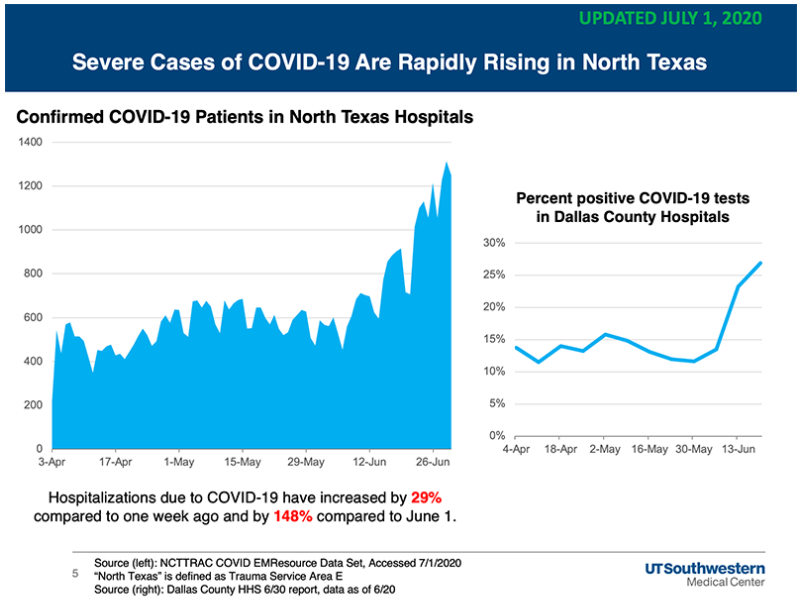
Of cases requiring hospitalization, more than two-thirds have been under 65 years of age, and about half do not have high-risk chronic health conditions. Diabetes has been an underlying high-risk health condition reported in about a third of all hospitalized patients with COVID-19.
UT Southwestern’s latest forecast projects an increase of 50% in hospitalizations by July 13. By July 13, Dallas County hospitals could see concurrent hospitalizations from COVID-19 increase to between 570 and 940 cases, the forecast said. Hospitalizations have increased by 29% in a week, and 148% compared to June 1.
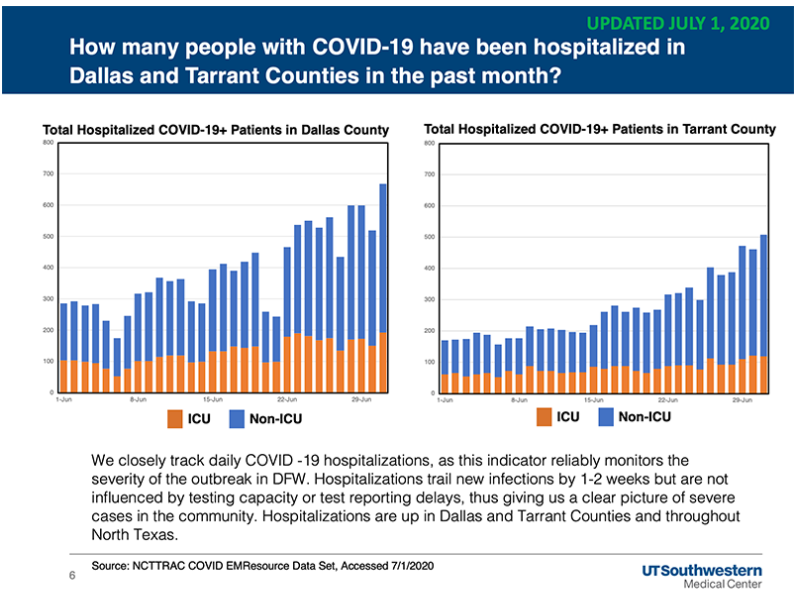
In the county’s July 3 aggregate report, most cases continue to be between the ages of 18 and 60, with the 18-40 age group accounting for 45% of the cases, and the 41-64 age group accounting for another 36% of the total cases.
“An increasing proportion of COVID-19 cases in Dallas County are being diagnosed in young adults between 18 to 39 years of age, such that of all cases reported after June 1, half have been in this age group,” the county said. “Increasing reports of cases are continuing to be associated with multiple large recreational and social gatherings since the beginning of June, including house parties.”
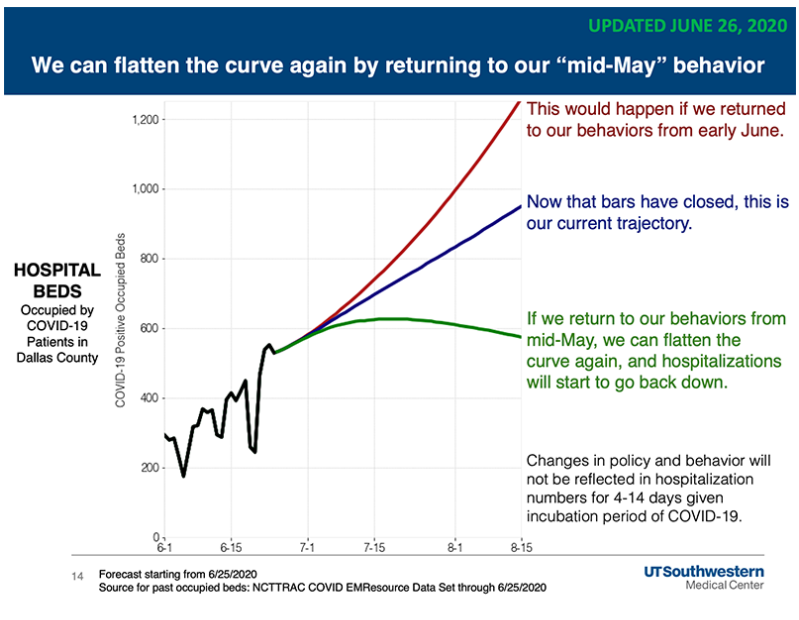
Close contact or community transmission continues to be the biggest risk factor for contracting COVID-19, accounting for roughly 91% of all cases. Living in a long-term care facility or being incarcerated in the county jail are a distant second, and third, at 3.2% and 2.3%, respectively.
Of the testing done, positive cases accounted for 33.7 % as of June 27, with 1,230 positives coming from 3,645 tests. Testing and positive test results of COVID-19 far outpaces any other respiratory virus – even if you combine them all.
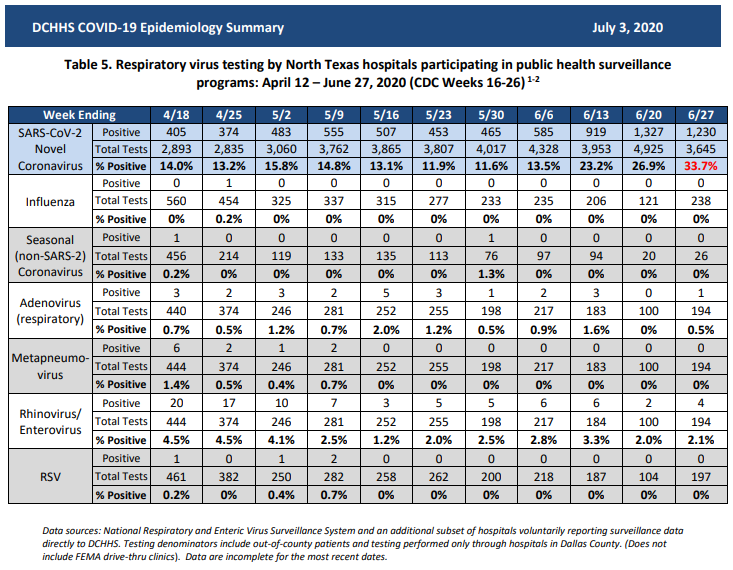
Thirteen percent of all cases ended up hospitalized – 26% ended up in intensive care, and 15% ended up on a ventilator.
In a city-by-city breakdown, Dallas still comes in with the highest number of cases – 13,277, or 56.1%. Highland Park has 25 cases so far, and University Park has 43.
Statewide, 2,133,457 tests have been administered, with 195,239 testing positive in 247 counties, and 2,637 deaths so far.
DCCHS Announces Emergency Housing Assistance

Dallas County Health and Human Services announced last week the launch of the Emergency Housing Assistance Program (EHAP) for residents of Dallas County.
This program provide short-term, rental, mortgage and utility assistance to Dallas County residents living outside the City of Dallas facing economic hardship in the wake of COVID-19. Assistance for EHAP is eligibility based and will be processed through a lottery system.
On July 1, 2020, DCHHS started accepting pre-screening applications online at https://www.dallascounty.org/ehap and will close the pre-screening application process on Thursday, July 9, 2020 at 4 p.m.
If an individual does not have access to the internet or is unable to access the pre-screening application online, they can call
Pre-screening applications accepted by phone will be conducted Monday – Thursday from 9 a.m. to 4 p.m. Submission of a pre-screening application does not guarantee eligibility or an offer of assistance. Only completed applications meeting eligibility requirements, and supported by required documentation, will be considered for assistance based on the availability of funds. Applicants must be 18 years of age or older to apply.
“Keeping people in their homes is critical, especially for slowing the rate of spread of COVID-19 in our community,” said DCHHS director Dr. Philip Huang. “This Emergency Housing Assistance Program will provide emergency assistance to individuals and families who have suffered financial hardship because of COVID-19.”
Parkland: Most Businesses Cannot Require a Negative COVID Test
Unless your business is a hospital or healthcare organization, you can’t require a negative test before an employee comes back to work after recovering from COVID-19, Parkland officials said.
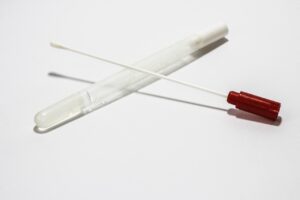
“In an effort to ensure there is adequate testing capacity, officials with Parkland Health & Hospital System are reminding businesses that unless they are a hospital or healthcare organization they cannot require a negative test result in order for an employee to return to work if they have recovered from COVID-19,” the hospital said.
The county supplemental order from June 16, 2020, states: “Employers shall not implement any rules making a negative COVID-19 test or a note from a healthcare provider before a COVID-19 recovered employee can return to work.” It further states that “this provision does not apply to hospitals or healthcare workers following the CDC’s test-based strategy for return to work criteria for healthcare personnel with confirmed COVID-19.”
“Parkland has seen instances where large employers have sent dozens of staff to drive-through testing sites who said they need a negative test result to return to work,” said Herron Mitchell, Director of Operations-East Region for the Population Health Division at Parkland. “This goes against the court order and limits the availability of tests for people who have experienced symptoms or a potential exposure to COVID-19.”
Mitchell added, “We appreciate that businesses are trying to address concerns of employees and customers, but Dallas County has a limited daily testing capacity at our drive-up sites and that capacity must be used for people who really need the tests.”
Parklans said that if companies want to encourage all of their employees to get tested regardless of symptoms or exposure, they should identify a private testing facility to provide tests either on a case-by-case basis or as part of a contractual relationship. The city, county and federal testing sites should not be used for that purpose.
FBI Warns About Fraud Schemes Related to COVID-19 Testing
The Federal Bureau of Investigation is warning the public about potential fraud schemes related to antibody tests for COVID-19.
Scammers are marketing fraudulent and/or unapproved COVID-19 antibody tests, potentially providing false results. In addition, fraudsters are seeking to obtain individuals’ personal information (names, dates of birth, Social Security numbers, etc.) and personal health information, including Medicare and/or private health insurance information, which can be used in future medical insurance or identity theft schemes.
In response to the vast number of COVID-19 cases, and in an effort to return to a normal economy as soon as possible, researchers have been encouraged to devise testing methods that can be quickly and easily deployed to test large numbers of individuals for COVID-19 antibodies. However, not all COVID-19 antibody tests have been approved by the U.S. Food and Drug Administration (FDA), and their efficacy has not been determined.
The FBI warns the public to be aware of the following potential indicators of fraudulent activity:
- Claims of FDA approval for antibody testing that cannot be verified
- Advertisements for antibody testing through social media platforms, email, telephone calls, online, or from unsolicited/unknown sources
- Marketers offering “free” COVID-19 antibody tests or providing incentives for undergoing testing
- Individuals contacting you in person, phone, or email to tell you the government or government officials require you to take a COVID-19 antibody test
- Practitioners offering to perform antibody tests for cash
The FBI recommends:
- Checking the FDA’s website (fda.gov) for an updated list of approved antibody tests and testing companies
- Consulting your primary care physician before undergoing any at-home antibody tests
- Using a known laboratory approved by your health insurance company to provide the antibody testing
- Not sharing your personal or health information to anyone other than known and trusted medical professionals
- Checking your medical bills and insurance explanation of benefits (EOBs) for any suspicious claims and promptly reporting any errors to your health insurance provider
- Following guidance and recommendations from the U.S. Centers for Disease Control and Prevention (CDC) and other trusted medical professionals
If you believe you have been the victim of a COVID-19 fraud, immediately report it to National Center for Disaster Fraud Hotline at

